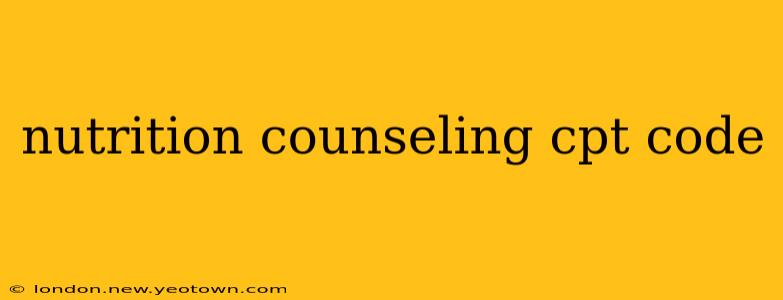Decoding the Nutritional Counseling CPT Code Maze: A Story of Clarity and Care
The search for the right CPT code for nutrition counseling can feel like navigating a labyrinth. Imagine you're a registered dietitian, meticulously crafting a personalized nutrition plan for a client struggling with diabetes. You’ve spent hours gathering information, analyzing their dietary habits, and developing a strategy tailored to their needs. Now, you need to bill for your services, and that's where the CPT codes come in – a seemingly cryptic system of numbers that dictate reimbursement. This article will unravel the mystery surrounding the CPT code for nutrition counseling, answering all your burning questions along the way.
What is a CPT Code?
Before we dive into the specifics of nutrition counseling, let's establish a foundational understanding. CPT (Current Procedural Terminology) codes are standardized medical codes used to describe medical, surgical, and diagnostic services. These codes are essential for billing insurance companies and ensuring accurate reimbursement for healthcare providers. They provide a common language that allows seamless communication between healthcare professionals and insurance payers.
What CPT Code is Used for Nutrition Counseling?
The CPT code for nutrition counseling isn't a single, straightforward number. The complexity arises because the level of medical nutrition therapy (MNT) provided varies greatly depending on the client's needs and the dietitian's expertise. The most commonly used codes fall under the umbrella of 97802, 97803 and 97804. These codes represent medical nutrition therapy services provided by qualified healthcare professionals, such as registered dietitians.
-
97802: This code signifies the initial nutrition assessment and intervention, often a lengthy session establishing the client’s nutritional history and setting initial treatment goals. Think of it as the blueprint for the entire process. This is typically the code used for the first visit.
-
97803: This is usually used for subsequent sessions focused on maintaining and adjusting the nutritional plan after the initial assessment, incorporating new feedback, or refining strategies based on progress. Imagine the architect checking on the construction of the building—monitoring progress and making any necessary adjustments.
-
97804: This is often associated with group sessions that are part of a larger nutrition intervention program.
The specific code used will depend on the time spent, the complexity of the case, and the services rendered. Always consult the most current CPT codebook and your insurance payer guidelines for precise coding.
How Long Does a Nutrition Counseling Session Typically Last?
The duration of a nutrition counseling session varies. It can range from 30 minutes to an hour, or even longer, depending on the client's needs and the complexity of their case. The initial assessment is generally longer than follow-up sessions. The time spent directly influences the coding and reimbursement process.
What's the Difference Between Medical Nutrition Therapy (MNT) and General Nutrition Counseling?
This is a crucial distinction! Medical Nutrition Therapy (MNT) is a specialized service provided by registered dietitians or other qualified healthcare professionals. It's medically necessary and focused on managing or preventing disease. Think of managing diabetes, heart disease, or kidney issues. This is often covered by insurance under those specific codes previously mentioned.
General nutrition counseling, on the other hand, is often more broad-based, focusing on general wellness or lifestyle changes. This might be weight loss or general healthy eating habits, and typically isn't covered by insurance. The type of counseling directly affects what can be billed, and how.
Do I Need a Referral for Nutrition Counseling?
The necessity of a referral depends entirely on your insurance provider and the type of nutrition counseling you receive. Many insurance plans require a referral from a physician for MNT, especially for chronic diseases. Always check with your insurance company to understand their specific requirements. It’s better to avoid costly billing disputes by clarifying before the first visit.
This journey into the world of CPT codes for nutrition counseling demonstrates the importance of clarity and precision in healthcare billing. By understanding the nuances of these codes and the services they represent, healthcare professionals can ensure accurate billing practices and effective communication with insurance companies. Remember, staying updated on the latest CPT code updates and insurance guidelines is crucial for navigating this complex landscape.

